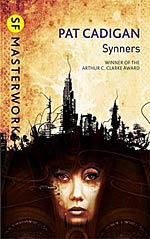
![]() Tar Daddoo
Tar Daddoo
10/20/2013
![]()
What is the Science Fiction Premise?
Synners focuses on the future of computer use as the interface between humans and computers becomes more direct. As the story opens, there is a somewhat crude ability to interface using advanced virtual reality techniques. During the story we learn of a new technology that ties the human brain directly to the computer.
In addition, Synners offers a secondary Science Fiction premise centered on a computer program that achieves awareness.
Is the science of the premise explored?
Synners does a reasonable job with its discussion of virtual reality techniques, brain function, and how they might interface. Its discussion of the localization of functionality in the brain is a little glib, but it would be persuasive to a non-expert.
More disturbing than the minor inaccuracies regarding brain science was its portrayal of how a malevolent force becomes unleashed in the network. Up until this point, the story stayed on the believable side of its extrapolation; then it became fanciful. It does not harm the story, especially for anyone who is as interested in Fantasy as Science Fiction. It is a bit disappointing, however, since the story had been doing such a good job of maintaining belief.
The aware computer program premise is definitely secondary. It is explained only quickly. It does offer some interesting constraints and capabilities, but our understanding of it is not strikingly different from our understanding of a human character.
Is the impact of the premise on an individual explored?
Much of the story centers on people who "program" computers by constructing visualizations and other sensory landscapes that can be stored and shared with others. After establishing how the current level of technology works, we then learn how the new advanced capability changes these people's lives.
Is the impact of the premise on society explored?
Synners does ask us to think about how far society should go in tolerating/encouraging immersion in artificial experiences. To some degree this is done by portraying a world that is already pretty messed up by simple virtual reality experiences and then taking it that one step further. It is a somewhat dystopic view, but there are hints that moderation and good sense can prevail, if applied.
How well written is the story?
I always find cyberpunk a bit difficult to read. You are dropped into unfamiliar and often unseemly situations. There is almost always a new jargon that is used without explanation or a primer. And, there are often mind-bending situations in which it is difficult to discern what is real and what is not. Synners does all of this, but it does eventually settle down into a comprehensible landscape. I couldn't say whether the author front-loaded the craziness or I simply learned how to make sense of it. Either way, it worked.
An interesting aspect of Synners is that the female lead is strong, while the male lead is weaker. This is not an unthinking gender role reversal; both characters were interesting and fully developed. Nor was this achieved by making gender irrelevant in the story. Gender was important, but it was not used to fall back on stereotypes. Instead, we are asked to appreciate each character in his or her own way.
Can I recommend the book?
I can recommend Synners which surprises me.
I do not ordinarily like cyberpunk all that much. Instead of blowing my mind with all the untapped possibilities, the stories simply confuse me (for the reasons mentioned above.) I am also often put off by how little Science there is to support the stories. Synners does suffer from these problems, but to a lesser degree than most. I found I really enjoyed the story after about a quarter of the way through when things started making sense. And, although aspects of the climax are quite fanciful, it was a tremendously enjoyable and satisfying ending.